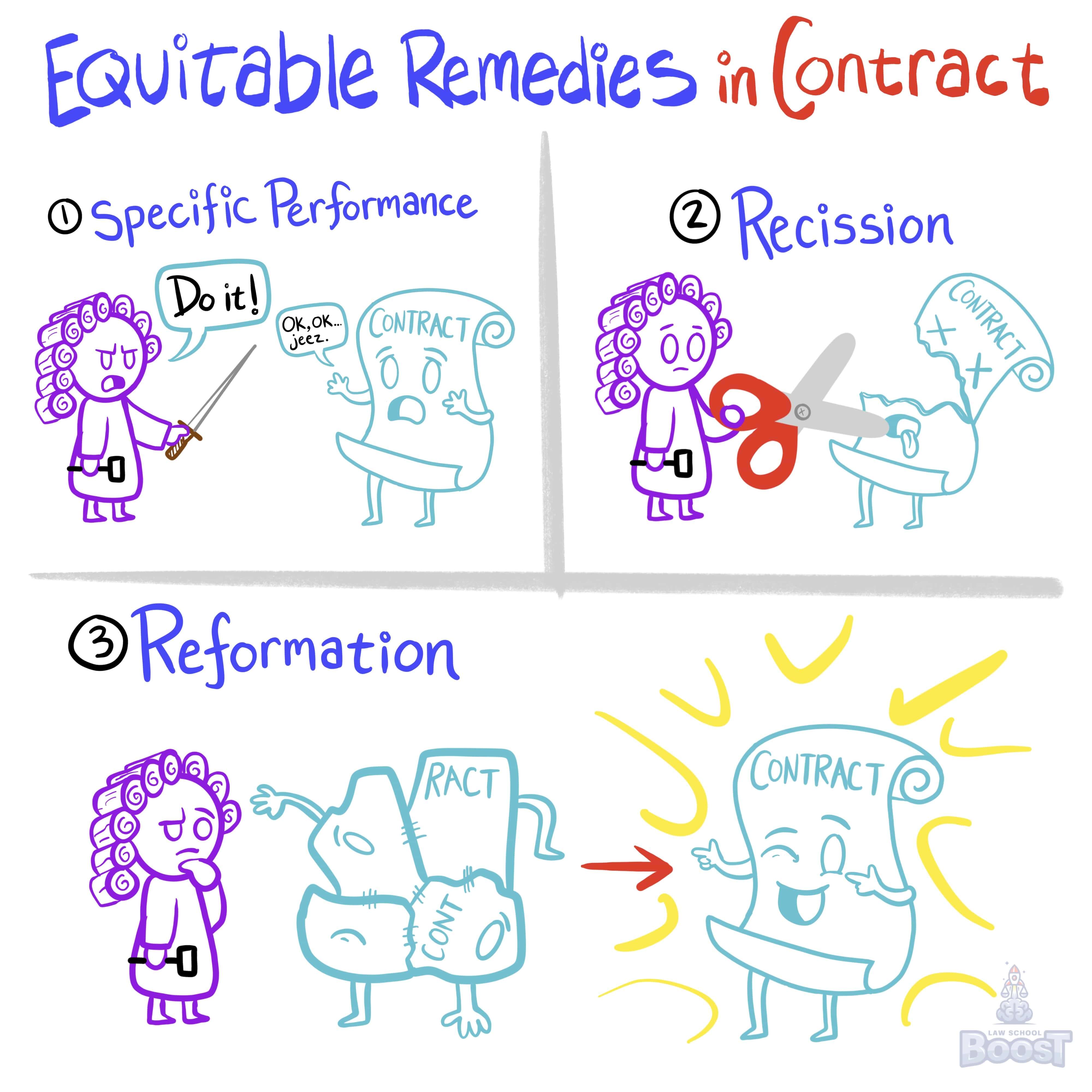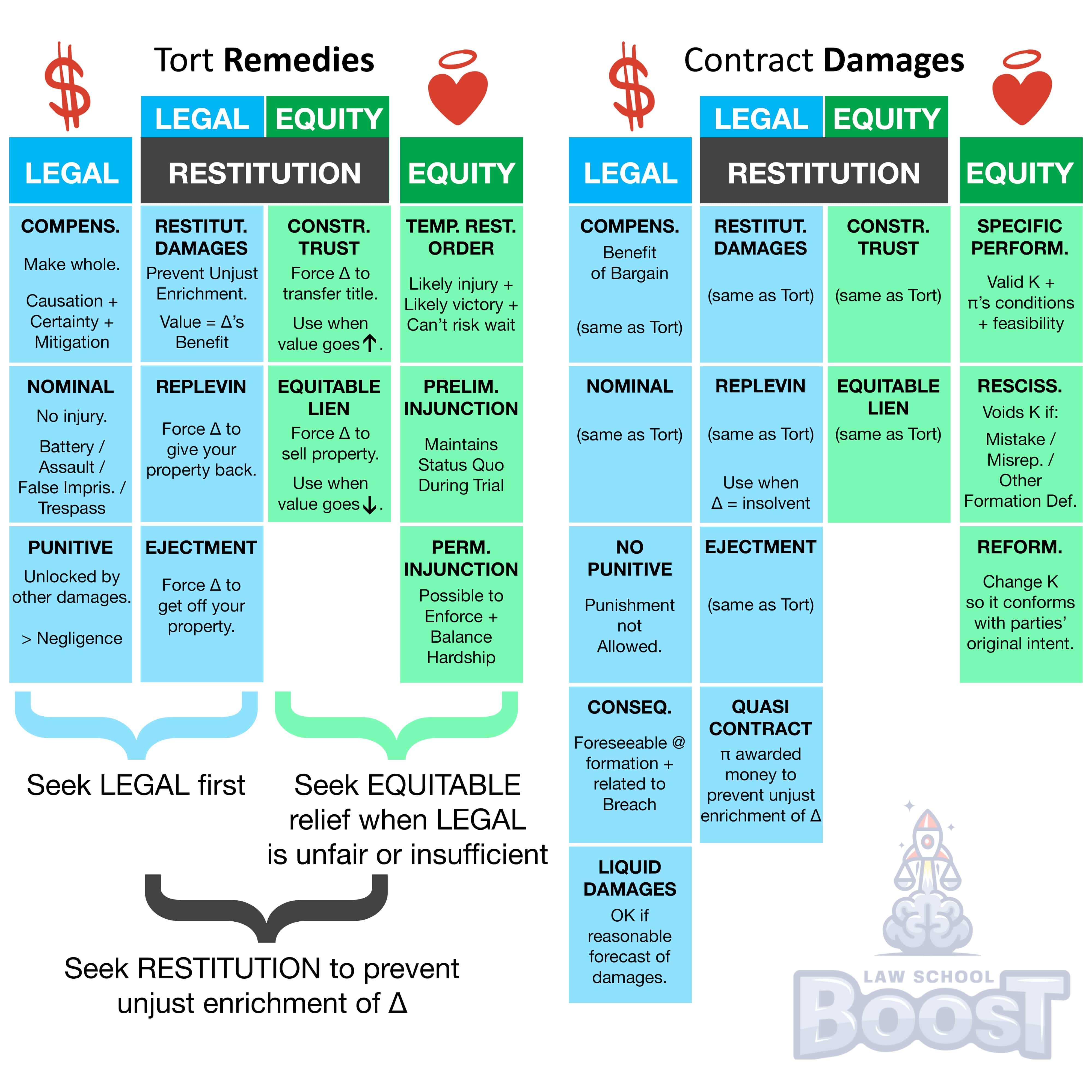🏥
Remedies • Contract - Equitable Remedies
REM#051
Legal Definition
Equitable remedies in contract consist of (1) specific performance, (2) rescission, and (3) reformation.
Plain English Explanation
Equitable remedies in contracts are like special solutions a court can give when money isn't enough to fix a broken deal. There are three main types:
Specific performance: This means making someone do exactly what they promised.
Rescission: This cancels the deal, so it's like it never happened.
Reformation: This changes the deal to what both parties originally intended.
Specific performance: This means making someone do exactly what they promised.
Rescission: This cancels the deal, so it's like it never happened.
Reformation: This changes the deal to what both parties originally intended.
Hypothetical
Hypo 1: Bob sells a unique, one-of-a-kind painting to Sam for $10,000. After receiving the money, Bob refuses to give the painting to Sam. Result: The court orders "specific performance," meaning Bob has to give the painting to Sam since it's unique and money can't replace it.
Hypo 2: Bob and Sam enter into a contract where Bob will sell his rare vintage car to Sam. However, Bob later discovers that the car has a major defect he wasn't aware of. Result: The court allows "rescission," canceling the deal and returning any money exchanged, because the car isn't as promised.
Hypo 3: Bob agrees to sell a piece of land to Sam. The written contract mistakenly lists the wrong plot number, but both parties intended to deal with a different plot. Result: The court uses "reformation" to correct the contract to reflect the plot both parties originally agreed upon.
Hypo 4: Bob promises to provide Sam with 100 handmade chairs for Sam's new restaurant. After delivering 50 chairs, Bob stops. Result: The court might order "specific performance," requiring Bob to deliver the remaining 50 chairs as they are custom-made and can't easily be replaced. However, this is only true if the chairs are available. It would be unconstitutional to force Bob to create 50 new chairs if he doesn't want to, which means monetary damages may be the only way for Sam to recover.
Hypo 5: Bob and Sam enter into a contract for Bob to mow Sam's lawn for $50. Bob doesn't mow the lawn. Result: This rule wouldn't apply here. Instead of any equitable remedy, Sam can just get a refund or hire someone else to mow the lawn. The situation is too simple and the solution (a refund) is straightforward.
Hypo 2: Bob and Sam enter into a contract where Bob will sell his rare vintage car to Sam. However, Bob later discovers that the car has a major defect he wasn't aware of. Result: The court allows "rescission," canceling the deal and returning any money exchanged, because the car isn't as promised.
Hypo 3: Bob agrees to sell a piece of land to Sam. The written contract mistakenly lists the wrong plot number, but both parties intended to deal with a different plot. Result: The court uses "reformation" to correct the contract to reflect the plot both parties originally agreed upon.
Hypo 4: Bob promises to provide Sam with 100 handmade chairs for Sam's new restaurant. After delivering 50 chairs, Bob stops. Result: The court might order "specific performance," requiring Bob to deliver the remaining 50 chairs as they are custom-made and can't easily be replaced. However, this is only true if the chairs are available. It would be unconstitutional to force Bob to create 50 new chairs if he doesn't want to, which means monetary damages may be the only way for Sam to recover.
Hypo 5: Bob and Sam enter into a contract for Bob to mow Sam's lawn for $50. Bob doesn't mow the lawn. Result: This rule wouldn't apply here. Instead of any equitable remedy, Sam can just get a refund or hire someone else to mow the lawn. The situation is too simple and the solution (a refund) is straightforward.
Visual Aids


Related Concepts
How does election of remedies affect a claim for rescission?
If a contract has a liquidated damages clause, is specific performance still an option?
What are common defenses to specific performance?
What are defenses to rescission?
What are the defenses to formation?
What happens if a plaintiff is entitled to rescission but has already performed?
What is reformation?
What is rescission?
What is specific performance and when it is applicable?
What is the part performance exception to the Statute of Frauds?
What type of mutual mistake is sufficient for rescission?
When applying specific performance to a land purchase contract, what happens if a buyer breaches a "time is of the essence" clause with a forfeiture clause?
When applying specific performance to a land purchase contract, what happens if the quantity of land is in dispute?
When assessing reformation, what constitutes sufficient grounds?
When assessing specific performance, how do courts weigh feasibility of enforcement?
When assessing specific performance to acquire a unique piece of property, when is uniqueness tested?
When assessing specific performance, what must the status be of a plaintiff's contractual conditions?
When assessing specific performance, why are money damages sometimes an inadequate legal remedy?
When assessing whether money damages are inadequate for specific performance, why does it matter whether a piece of property is unique and what kind of property is always unique?
When is personal property considered unique enough to trigger specific performance?
Will courts grant rescission for a unilateral mistake?


